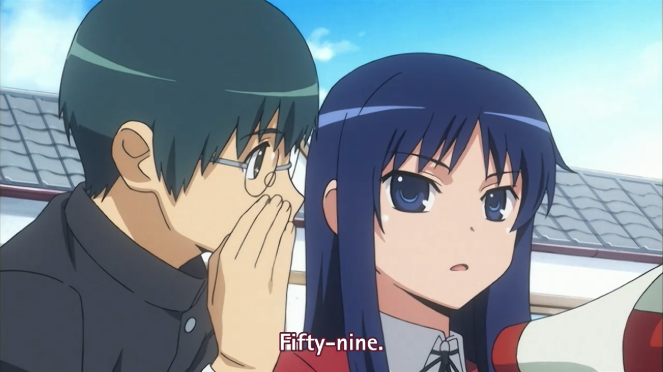Welcome to Episode 4 of Toradora. Check out our discussion of Episode 4 of Shiki on Primes’ website when it’s up.

The student council president (I think that’s what she is?) is introduced! With her distinct personality and how the whole school fawns over her, she seems like a pretty important character. I don’t see her in pictures featuring Toradora‘s main cast though, so I’m not sure. Ms. President is crude, imposing, but ditzy. I bet she grew up in a yakuza household, and I think I like her.
Primes: This cracked me up! I love your description of her! 😀
Haha, I must be way off!

Taiga drowns in happiness in English class because Kitamura physically held her back during the assembly. This poor guy called Haruta has to read aloud twice in a row in his broken English because Taiga is unavailable. I paused the screen to read the English on the board, and it’s another hidden dragon/tiger reference, this time about the tiger. I don’t really know if there’s much to say about these, but they’re always fun. Here’s my attempted transcription:
“It has been stopped in the airport though he tried to take the unusual one home from the foreign country. The unusual one was called in the world that meant the tiger in the country. After all, the wish did not have to be fulfilled, though he wanted to take it home to my country by all means, and to show it to the king. The story was heard, and the king came to want it from man who returned home by all means though it was unusual. The king did not listen to his word, though he desperately persuaded his king. […] the unusual one was everyone’s one. However, the unusual one was only one man already these days.”
Wow, that was long. I’d call it an attempt at placing the tiger in the mythical realm to match the dragon. The king wants to possess the tiger, which cannot be possessed by anyone. That seems to describe our Taiga.
Primes: Wow, thanks for calling attention to this! I never noticed it on three viewings! (I confess I don’t entirely follow the meaning of the transcription; so if I err let me know.) My question, then, is: Why place the Tiger in the realm of myth? What is accomplished? It’s worth remembering that myth is pre-rational (this does not mean anti-rational). Reason works by identifying relationships between concepts, as seen in its origin from the Latin word ratio (from which we also get our word “ratio”, that is, a relationship between quantities). Therefore, we have an understanding of at least some relationships before we ever start to reason. Where does this understanding come from? From myths, that is, stories that have a pre-rational power on the imagination. (“Myth”, by the way, comes from the Greek mythos, “story”.)
Put another way, reason is all about drawing analogies or comparisons between concepts; myths provide a set of concepts which the mind can use for its analogies, and a set of relationships that can serve as patterns for drawing said relationships. Reason builds cities on the grounds and with the tools and materials that myth provides.
A fun and enlightening question to ask yourself, the next time you hear someone providing an explanation or account of something, is, “What is the story that this person is using as the basis for his or her analogies (in other words, his or her thoughts)?” For Freud, it’s Oedipus: The foundation of his ideas is simply drawing an analogy between Oedipus and the human experience of sexuality. For Rene Girard, it’s the Scapegoat and the Foundation Sacrifice; he draws analogies between these and practically all of the social sciences and humanities. For James Frazer, it was the Golden Bough, which he analogized to pretty much all of humanity’s rituals. For students of Darwin, it was the evolution of all living things, which they analogized to cosmology, civilization, and other things that are not biological (even theology!). It doesn’t always matter whether the myth is literally or historically true (though sometimes it does); that’s not the point at all. The point of the myth, what makes it a myth, is the power it has to shape our understanding of what is literally and historically true.
Turning back to Toradora, then, it sounds like the writers are deliberately creating a myth (centered around the tiger and dragon) within the anime. Naturally, such a myth would be expected to shape our understanding and experience of the anime. You’ve sketched out part of the myth here, about a king wanting to possess the tiger. Now, who is king? It may have been Kitamura at one time, but it isn’t now. It might be Ryuji in the future, but doesn’t seem to be yet.
I would suggest the king is Taiga herself. We can already see what will become painfully clearer down the road: Taiga is constantly struggling to convince herself that she has control over her life; at the back of her mind is a little voice telling her, “You don’t have control and you can’t.” Her past experiences, her broken dreams and relationships, are her myth—the story she reads day after day after day in her attempt to make sense of her world.
Wow, you watched this anime three times? Thanks for expanding on this simple idea. I didn’t dig too deeply into it because I wasn’t sure I understood the English or if it was meant to be understood all that much, but Primes did the work for me! I was originally only thinking of the myth as an attempt to put the tiger on the same level as the dragon, as a continuation of our last discussion on how the dragon exists outside of the world of reality.
I just love your interpretation of it. If the myth of the dragon and tiger is at the centre of this narrative, then perhaps it’s also about how they try to possess/dominate each other, as is the case in almost every tale featuring the two’s encounter? I especially like the idea of the king being Taiga herself. If Taiga struggles to control the tiger inside of her, does Ryuji have the same problem with the dragon in him? …Does he even have a dragon in him? Surely he does; I just can’t quite figure out what form it takes. The issue of having to overcome his dad’s shadow was brought up in the first episode, but it hasn’t really come up again either.
Primes: Can anyone, even Ryuji, write a new myth for her? People have died for myths; will Taiga outlive hers?
Don’t know, but I do know that I’m going to pay lots of attention the next time they have English/literature class. Also, I just noticed that it says “Chapter 1,” so Taiga still has infinite potential…

Ryuji scrubs the boys’ bathroom walls furiously with a toothbrush! He claims that mold grows the most in public facilities. Is it a subtle social critique? People care the least for shared things, because it’s no one’s responsibility. Yet, Ryuji sees it as his own job. His tendency to take responsibility for others is reflected in his compulsion to better Taiga’s life. Not sure whether to call it virtuous or problematic at this point, but I’m leaning towards the latter.
Primes: Oooh, time for a little Deconstruction! *rolls up sleeves* To say it’s “either” virtuous “or” problematic is a particularly modern way of reading the situation. A post-modernist might argue that your own uncertainty as to how to interpret the story reveals that “virtuous vs. problematic” is a false contrast: It forces us to ask, “Can virtue itself be problematic? Can problematic characteristics also be virtuous? In the end, what do ‘virtuous’ and ‘problematic’ even mean?” (I had a college friend who, no matter what the topic of conversation, would ask in all seriousness, “But what does it mean?!” He was a lot of fun at parties.)
That is very true. Even if it’s a problematic trait, Ryuji’s feelings of responsibility towards others is still something that is generally considered virtuous, and we are led to feel that way by all the “aww” moments in the anime where Ryuji makes Taiga’s life nicer and Taiga feels it. It’s also a very shoujo-love-interest trait (and a shounen protagonist one, really). I look forward to a subtle deconstruction of this trope.
Kitamura appears out of nowhere all the frickin’ time. It’s getting unnerving…

Primes: I think he’s a younger, Japanese version of Jeeves.
I don’t know Jeeves, but he sounds like a nightmare.
So Kitamura confessed first to Taiga, but was rejected by Taiga because she couldn’t handle the abruptness. That was the reason Taiga developed feelings for Kitamura. Wow, so it’s not because Kitamura is the ideal senpai to daydream about, but because Kitamura treated her as the dream to chase after. Another miss on my part! I think the feelings Taiga has are incredibly understandable. It’s natural to appreciate someone who affirms your identity, especially if it’s not something you often get. Would you call it love?
Primes: I’d call it ‘flattery’. Would it be too harsh to say that Taiga is not in love with Kitamura, but rather with the image of herself that Kitamura’s approval permits her to hold?
Yeah, I’d agree with that. Earlier today, I came across this article called “Identity – and Loneliness,” which asserts under the section “Pride and Love” that people often confuse pride for love. To quote the article, “many persons ‘give’ in order to advertise an identity and to maintain a position of power. This is pride, not love, because love empties itself of worldly desires through service, in order to give selflessly. Pride, however, makes ‘giving’ into a form of bribery, in order to get something bigger in return.”
Primes: It was fun reading this article! I kept going back and forth along the lines of “I am pretty doubtful about that” and “Woah, that’s an amazing insight!”
Yup. Now, this is one highly cynical perspective on love in our society, especially since the author makes the generalization that hospital workers care more about establishing their authority than about their patients, but perhaps there is some truth in the suggestion that love and identity are intertwined. I don’t know if it makes sense that Taiga appreciates Kitamura because she likes the idea of exercising authority over him, especially when she obviously doesn’t look like the one in control of anything right now. You can’t deny that Kitamura’s acceptance of her would pamper her ego though – as it would anyone’s. A danger of psychological theories is that humans all seem like selfish beasts under those rational explanations. Well, I can’t exactly refute that, but…those theorists must live really sadly? Ahem, back to the topic, an explanation for why Taiga’s love for Kitamura doesn’t feel genuine (as Kitamura possibly perceives?) is that she loves how he makes her feel more than him as a person.
Primes: Huh, I think we both came to the same set of conclusions! As far as humans being selfish beasts goes, that’s easily dispelled by a brief look at zoology. We’re mammals, and mammals are nothing if not tribal, social, and ready to sacrifice themselves for the good of their group. Any functional theory of psychology has got to take that into consideration.
Yeah, love is complicated! From Aristotle onward, philosophers and later psychologists have argued that all humans want happiness. But if you consider how many people have made themselves miserable to be with someone they loved, I think it’s clear that what we all really want is love. And that makes no sense if we’re intrinsically selfish—but it does if we’re intrinsically social.
Well put. This post is getting pretty long, and I don’t have much to add!
Thank you for the fun insights and conversation! 🙂
Thank you! It was fun going through everything.

Ouch.
Since I’ve never had a legitimate class in writing, my understanding of myth in stories is iffy… I can understand the logic of the analysis, but I can’t apply mythological reasoning myself!
;_;
But it was a fun read!
Primes really likes to play devil’s advocate, it seems.
LikeLiked by 2 people
Thanks for reading and commenting, edgyanimeteenblog! I got rather long-winded there without meaning to, so I’m glad you enjoyed our conversation! 😺
LikeLiked by 3 people
I love their poor teacher, cheer up sensei!
LikeLiked by 2 people
I know this is pretty pointless to what you were saying, but I wish that kid would come clean my house…
LikeLiked by 2 people
Haha…who doesn’t! He can also clean an entire space within, what, 15 minutes? Adopt him, he’s a keeper…
LikeLiked by 1 person